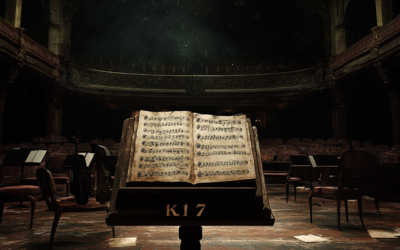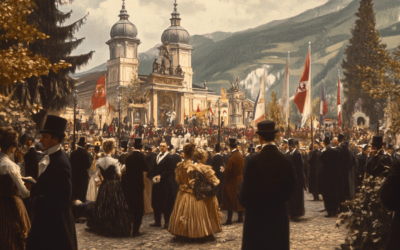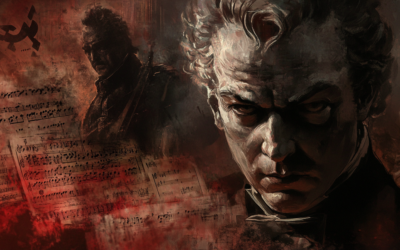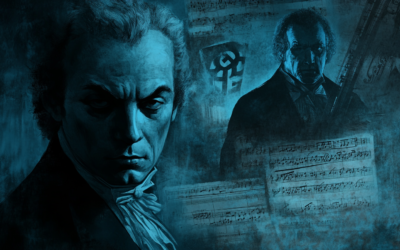Leopold Mozart’s Fabricated Legacy
The False Sonnet of Corilla Olimpica
Leopold Mozart’s relentless pursuit of fame for his son Wolfgang led to questionable tactics, including fabricating a sonnet by the renowned poetess Corilla Olimpica. This desperate attempt to elevate Wolfgang’s reputation casts a shadow over the Mozart legacy.
Mozart: The Fall of the Gods
This book offers a fresh and critical look at the life of Wolfgang Amadeus Mozart, challenging the myths that have surrounded him for centuries. We strip away the romanticised image of the “natural genius” and delve into the contradictions within Mozart’s extensive biographies. Backed by nearly 2,000 meticulously sourced citations, this work invites readers to explore a deeper, more complex understanding of Mozart. Perfect for those who wish to question the traditional narrative, this biography is a must-read for serious music lovers and historians.
"Leopold Mozart's false claim that Corilla Olimpica wrote a sonnet for Wolfgang was not just a father’s exaggeration—it was a deliberate fabrication to manufacture a legacy that never existed."
@MozartrazoM
One of the most infamous examples of Leopold Mozart’s manipulative behaviour during Wolfgang’s Italian tour in 1770 involves the celebrated poetess Maria Maddalena Morelli Fernandez, better known as Corilla Olimpica. According to Leopold’s letters, Corilla supposedly composed a sonnet in honour of Wolfgang, delivered by the English violinist Thomas Linley. However, this story is full of glaring inconsistencies, pointing to a deliberate fabrication by Leopold in his effort to promote his son.
Corilla was a respected figure in the Florentine cultural scene, renowned for her eloquent poetry. Yet, the so-called sonnet Da poi che il Fato t’ha da me diviso, supposedly dedicated to Wolfgang, is riddled with grammatical errors and lacks any reference to Mozart’s actual musical talents. Its generic content could have been directed at anyone, making it highly unlikely that Corilla, known for her precision, would have penned such a lacklustre piece.
More damning is the fact that Corilla herself never mentioned writing any poem for Mozart, nor did Linley, the alleged intermediary. The complete absence of this event from contemporary records and Corilla’s own writings strongly suggests that Leopold invented the entire episode. It seems that Leopold, ever the ambitious stage father, was willing to bend the truth to construct a narrative that would further glorify his son. By associating Wolfgang with prominent cultural figures like Corilla, Leopold hoped to boost his son’s status in the eyes of the aristocracy and potential patrons.
Leopold’s need to fabricate this sonnet speaks volumes about the lengths he was willing to go. Far from being an innocent promoter of his son’s talent, he consistently manipulated events and exaggerated Wolfgang’s achievements. The supposed involvement of Corilla Olimpica in Mozart’s early career is yet another instance of Leopold’s unscrupulous methods to establish his son’s reputation, even at the cost of truth.
The reality is that Corilla, at the time, was far more focused on her relationship with the violinist Pietro Nardini, not on some adolescent prodigy passing through Florence. Leopold’s fabrication reveals a deep insecurity about his son’s place in the musical world, and this episode casts serious doubt on the authenticity of many accounts from Wolfgang’s early career.
You May Also Like
Constanze Mozart’s Enduring Love
Although some have doubted her devotion, Constanze’s own words and actions illustrate a widow deeply committed to preserving Mozart’s legacy. Diaries, personal correspondence, and eyewitness testimony all challenge the notion that she neglected his memory—while the circumstances around his burial grow ever more perplexing.
A Revealing New Interview on His Thematic Catalogue
We’re excited to present a brand-new interview that challenges many of the long-held assumptions about Mozart’s Thematic Catalogue (1784–1791). Conducted by Swedish journalist Henry Grynnsten, this conversation delves into groundbreaking forensic techniques—like advanced ink analysis and digital image processing—that may change the way we view Mozart’s late works.
The Rattling Symphony: A Critical Take on K. 17
Often attributed to Mozart, the K. 17 symphony is anything but refined. Lacking orchestration and filled with gaps, it raises more questions than answers about its true authorship.
The Hidden Origins of the Salzburg Festival: A Nationalist Dream
The Salzburg Festival, far from being a mere celebration of Mozart’s genius, was born out of nationalist ambitions during a turbulent period in Austro-German history. Conceived by figures like Max Reinhardt, Heinrich Damisch, and Friedrich Gehmacher, the festival was deeply rooted in ultranationalistic ideals, transforming Mozart’s legacy into a tool for cultural dominance. The truth behind its founding has long been obscured, but the primary sources tell a different, darker story.
Mozart, Wagner, and the Nazi Myth
The Führer’s admiration for Wagner’s racially charged ideology not only influenced the policies of the Nazi regime but also reshaped the legacy of Mozart. Under National Socialism, Mozart was not celebrated as a universal genius but as a symbol of German purity and superiority. His music, stripped of its international influence, was rebranded as an expression of Aryan identity, intended to unify and inspire the German people.
Mozart, the Anschluss, and Nazi Propaganda
Following the 1938 Anschluss, the Nazi regime rebranded Mozart as the quintessential German composer, using his image to promote unity between Austria and Germany. The Salzburg Festival became a platform for Nazi propaganda, distorting Mozart’s legacy to fit their nationalistic and racial agenda.







